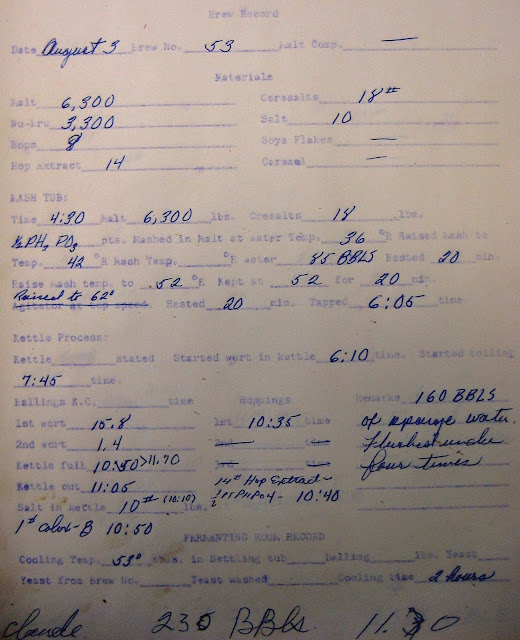On Monday, June 30, 1969, the Oshkosh Daily Northwestern ran a brief story on page six explaining that OBC was being sold. Uihlein had agreed to sell his majority stake to a coalition of Oshkosh residents doing business as Hometown Brewery, Inc. Terms of the sale were not disclosed.
The brewery’s new president would be Harold Kriz. He had been with OBC since 1952. Kriz had worked his way up through the ranks. He was the brewery’s general manager at the time of the sale. The new OBC board of directors included Kriz and three other long-time OBC employees: Roger Zillges, Audrey Ackerman and William Cowap. Oshkosh attorney Robert R. Thompson rounded out the five-member board.
Considering their level of experience, the new directors had to have realized what they were up against. In 1969, there were just 15 breweries operating in Wisconsin. Ten years earlier, the state had been home to 32 functioning breweries. The downward drift didn’t bode well for Harold Kriz and the new management at OBC.
 |
| Harold Kriz |
Uihlein hadn’t cared for that approach. His goal had been to expand the brewery’s distribution footprint. The strategy failed to yield dividends. And in the meantime, OBC’s share of the Oshkosh market shrank.
As the name implied, Hometown Brewery, Inc. intended to reverse the local slide. But there was an essential piece of the strategy that had gone missing. Leinenkugel’s and Point held their local markets by producing quality beer. OBC was no longer in the habit of doing that.
Chief Oshkosh Beer had degraded into a compromised brew made from the cheapest ingredients. The decline in quality was a fairly recent development. It was a beer once lauded by industry experts. When the J.E. Siebel Sons’ Company (forerunner to today’s Siebel Institute) examined Chief Oshkosh in February 1960, its offered a glowing review.
The sample submitted can be judged most favorably in every respect. It is a chemically and physically sound product… The product pours with a creamy stable foam showing attractive volume and texture… Further observed is the brilliant clarity of the beer… We are most impressed with the fine organoleptic properties. The beer is clean, smooth on the palate, fairly aromatic with a bare touch of wininess, yet mild, as well as pleasingly hopped. In particular, it is the fresh and unoxidized character which is welcome to the critical taster… The sample was given a very good rating in blindfold taste trials.
The year after that review came in, David Uihlein purchased OBC. The recipe was changed. Uihlein was bent on economizing. Quality was no longer paramount. The beer suffered. Its character undermined. One reviewer who recalled the 1960s version of Chief Oshkosh had scathing criticism…
I should state that I have never encountered a beer without some redeeming social value, save two appalling Wisconsin concoctions, Chief Oshkosh and Oconto… Gad what sewage!
- R. Emmett Tyrell Jr., Lakeland Ledger, October 22, 1976.
Harsh. But not surprising when you appraise what was going into the beer. Over the course of the 1960s, the mixture of adjuncts that found their way into Chief Oshkosh Beer included soy flakes, corn syrup and hop extracts. A 1971 brewer’s log offers a glimpse under the hood of Chief Oshkosh Beer. The second ingredient, listed as Nu-Bru on this sheet, was a corn syrup. OBC bought tanker loads of it.
This was not a beer that would win back people who knew Chief Oshkosh in its prime. If Kriz and the crew at Hometown Brewery had hopes of reviving past glories their expectations had to have been short lived. By the end of 1969, the reality of their situation was inescapable. OBC was in free fall. Production for the year fell to just 33,613 barrels. It was the brewery’s lowest output since 1940.
The cratering gathered momentum. As OBC’s sales declined, cash flow diminished. Limited funds made it impossible to improve the beer’s quality. The only avenue left to pursue was discount pricing. By 1970, Chief Oshkosh had become one of the cheapest beers sold in Wisconsin. The low price a testament to its repute.
 |
| Ad for cheap quarter barrels of Chief Oshkosh, Eau Claire Daily Telegram, May 14 1970 |
Four months later it ended. Rumors that the brewery would close were reported by the Oshkosh Daily Northwestern on October 20, 1971. When asked if the rumors were true, brewery spokesperson Audrey Ackerman responded, "We haven't decided yet."
Actually, the fate of OBC had been decided for some time. The last batch of Chief Oshkosh Beer produced at the Doty Street brewery was brewed on September 9, 1971. The following month, the Oshkosh Brewing Company made the announcement everyone knew was coming: it was closing. The Hometown Brewery had come to its end.









What happened to the recipe for Chief Oshkosh, when it was good?
ReplyDeletehttp://oshkoshbeer.blogspot.com/2014/01/the-story-of-chief-oshkosh-beer-and-how.html
DeleteWhat was the address of the original brewery
ReplyDelete